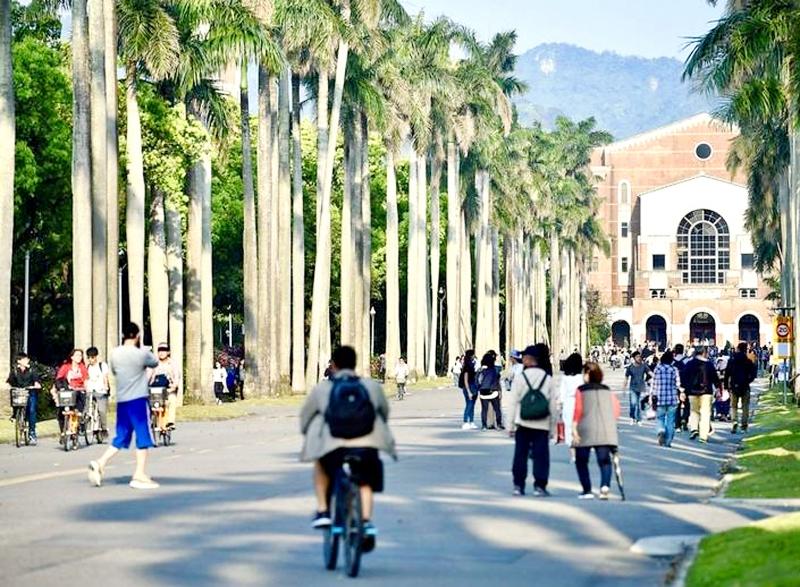Harvard University is to relocate its summer Mandarin program from Beijing to National Taiwan University (NTU) starting next year, a student publication reported on Thursday last week.
Run at Beijing Language and Culture University (BLCU) since 2004, the Harvard Beijing Academy is to become the Harvard Taipei Academy once it moves to Taiwan, Crimson magazine reported.
Program director Jennifer Liu (劉力嘉) attributed the decision to a “perceived lack of friendliness” from the Chinese university, potentially due to shifting political winds.

Photo: Wu Po-hsuan, Taipei Times
Liu told the magazine that BLCU in recent years had failed to provide a single dorm for the students or separate accommodation of equal quality.
It also banned the program’s Fourth of July celebration for students and faculty in 2019 amid a souring of attitudes toward US institutions since Chinese President Xi Jinping’s (習近平) rise to power, she said.
However, Harvard Center Shanghai chair William Kirby maintained that the move was purely for logistical reasons, telling Crimson that Harvard has overall been forming closer connections with China.
“This is not a time in which this university is retreating from its engagement with China — it’s actually seeking every way possible to deepen it,” the magazine quoted Kirby as saying.
Kirby cited collaborations between Chinese academics and the Fairbank Center, the Harvard Kennedy School Asia Fellows Program and the Harvard Center Shanghai, which has been holding in-person events even while the rest of Harvard has been shut down due to the COVID-19 pandemic.
NTU said that the program was scheduled to begin in the summer last year following discussions that started in 2019, but the COVID-19 pandemic delayed the opening to next year.
Hopefully, the free academic atmosphere at NTU would provide a solid foundation for Harvard University students to study Mandarin, while NTU students could develop a more international perspective through engagement with their US peers, NTU added.
As an official Harvard Summer School program, the eight-week course is to be taught by Harvard faculty from June to August next year.
The Harvard Taipei Academy Web site promises the same academic rigor as the Beijing program, with the opportunity for immersion in “the dynamic and diverse society and culture of Taiwan — a unique island where tradition and modernity are intertwined.”
Five hours of classes for about 60 students are to be offered daily from Monday to Thursday, with exams every Friday.
The program also promises weekend excursions and cultural extracurricular activities such as taichi and calligraphy, as well as modern accommodation just off campus.
National Taiwan Normal University Department of Chinese as a Second Language chair Tsai Ya-hsun (蔡雅勳) said that Mandarin education is excellent on both sides of the Taiwan Strait, but China has eclipsed Taiwan as a study destination since the 1980s.
However, with the worsening of relations between the US and China, and the former’s labeling of Confucius Institutes as foreign missions, Taiwan is once again becoming an attractive study location, she said, adding that she believes the free environment in Taiwan could be advantageous to language learners.
Additional reporting by Wu Po-hsuan

CHAOS: Iranians took to the streets playing celebratory music after reports of Khamenei’s death on Saturday, while mourners also gathered in Tehran yesterday Iranian Supreme Leader Ayatollah Ali Khamenei was killed in a major attack on Iran launched by Israel and the US, throwing the future of the Islamic republic into doubt and raising the risk of regional instability. Iranian state television and the state-run IRNA news agency announced the 86-year-old’s death early yesterday. US President Donald Trump said it gave Iranians their “greatest chance” to “take back” their country. The announcements came after a joint US and Israeli aerial bombardment that targeted Iranian military and governmental sites. Trump said the “heavy and pinpoint bombing” would continue through the week or as long

TRUST: The KMT said it respected the US’ timing and considerations, and hoped it would continue to honor its commitments to helping Taiwan bolster its defenses and deterrence US President Donald Trump is delaying a multibillion-dollar arms sale to Taiwan to ensure his visit to Beijing is successful, a New York Times report said. The weapons sales package has stalled in the US Department of State, the report said, citing US officials it did not identify. The White House has told agencies not to push forward ahead of Trump’s meeting with Chinese President Xi Jinping (習近平), it said. The two last month held a phone call to discuss trade and geopolitical flashpoints ahead of the summit. Xi raised the Taiwan issue and urged the US to handle arms sales to

BIG SPENDERS: Foreign investors bought the most Taiwan equities since 2005, signaling confidence that an AI boom would continue to benefit chipmakers Taiwan Semiconductor Manufacturing Co’s (TSMC, 台積電) market capitalization swelled to US$2 trillion for the first time following a 4.25 percent rally in its American depositary receipts (ADR) overnight, putting the world’s biggest contract chipmaker sixth on the list of the world’s biggest companies by market capitalization, just behind Amazon.com Inc. The site CompaniesMarketcap.com ranked TSMC ahead of Saudi Aramco and Meta Platforms Inc. The Taiwanese company’s ADRs on Tuesday surged to US$385.75 on the New York Stock Exchange, as strong demand for artificial intelligence (AI) applications led to chip supply constraints and boost revenue growth to record-breaking levels. Each TSMC ADR represents

Pro-democracy media tycoon Jimmy Lai’s (黎智英) fraud conviction and prison sentence were yesterday overturned by a Hong Kong court, in a surprise legal decision that comes soon after Lai was jailed for 20 years on a separate national security charge. Judges Jeremy Poon (潘兆初), Anthea Pang (彭寶琴) and Derek Pang (彭偉昌) said in the judgement that they allowed the appeal from Lai, and another defendant in the case, to proceed, as a lower court judge had “erred.” “The Court of Appeal gave them leave to appeal against their conviction, allowed their appeals, quashed the convictions and set aside the sentences,” the judges